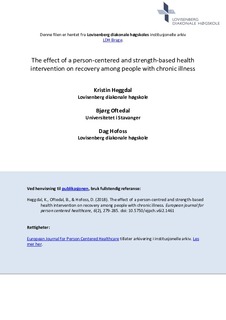| dc.contributor.author | Heggdal, Kristin | |
| dc.contributor.author | Oftedal, Bjørg Frøysland | |
| dc.contributor.author | Hofoss, Dag | |
| dc.date.accessioned | 2018-07-05T09:12:43Z | |
| dc.date.available | 2018-07-05T09:12:43Z | |
| dc.date.created | 2018-03-26T18:26:56Z | |
| dc.date.issued | 2018 | |
| dc.identifier.citation | European Journal for Person Centered Healthcare. 2018, 6 (2), 279-285. | nb_NO |
| dc.identifier.issn | 2052-5656 | |
| dc.identifier.uri | http://hdl.handle.net/11250/2504472 | |
| dc.description.abstract | Background: Strengthening the health capacities of people diagnosed with a chronic illness is an essential part of secondary and tertiary prevention. However, research-based interventions focussed on health and recovery in chronic illness remain scarce. Additionally, these are often designed for specific diagnostic groups while healthcare workers are in need of more broadly applicable interventions that attend to personal resources for health. The aim of the present study was to trace patient recovery during an intervention designed to strengthen their bodily knowledge as an important resource for coping, recovery and health in chronic illness.
Design and methods: The Outcome Rating Scale (ORS) was applied, as this instrument repeatedly measures progress in coping and recovery. Four dimensions were assessed: (1) individual (personal or symptomatic distress or wellbeing); (2) interpersonal (relational distress or wellbeing); (3) social (patient satisfaction with work, school and relationships) and (4) overall (general sense of wellbeing).
Results: The sample comprised 13 men and 24 women who had been diagnosed with a range of long-term conditions and were attending the person-focussed health intervention in their community. Significant change was identified during the programme period. The findings indicate more improvement on the personal and general wellbeing dimensions than on the interpersonal and social dimensions. The number of participants scoring above the ORS cut-point of 25 increased by a factor of 1.7, demonstrating the programme’s efficiency.
Conclusions: The results indicate that The Bodyknowledging Programme had a significant impact on the various forces driving recovery in chronic illness. | nb_NO |
| dc.language.iso | eng | nb_NO |
| dc.subject | kronisk sykdom | nb_NO |
| dc.subject | helsefag | nb_NO |
| dc.subject | personsentrert helsevesen | nb_NO |
| dc.subject | health promotion | nb_NO |
| dc.subject | patients as partners | nb_NO |
| dc.subject | recovery | nb_NO |
| dc.subject | self-management | nb_NO |
| dc.title | The effect of a person-centered and strength-based health intervention on recovery among people with chronic illness | nb_NO |
| dc.title.alternative | The effect of a person-centered and strength-based health intervention on recovery among people with chronic illness | nb_NO |
| dc.type | Journal article | nb_NO |
| dc.type | Peer reviewed | nb_NO |
| dc.description.version | publishedVersion | nb_NO |
| dc.subject.nsi | VDP::Medical disciplines: 700::Health sciences: 800 | nb_NO |
| dc.source.pagenumber | 279-285 | nb_NO |
| dc.source.volume | 6 | nb_NO |
| dc.source.journal | European Journal for Person Centered Healthcare | nb_NO |
| dc.source.issue | 2 | nb_NO |
| dc.identifier.doi | 10.5750/ejpch.v6i2.1461 | |
| dc.identifier.cristin | 1575842 | |
| cristin.unitcode | 217,13,0,0 | |
| cristin.unitname | Det helsevitenskapelige fakultet | |
| cristin.ispublished | true | |
| cristin.fulltext | original | |
| cristin.qualitycode | 1 | |
